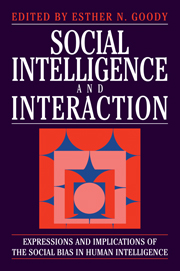 Social Intelligence and Interaction
Social Intelligence and Interaction Book contents
- Frontmatter
- Contents
- List of contributors
- Conventions used in transcripts
- Preface
- Introduction: some implications of a social origin of intelligence
- Part I Primary processes
- 1 The ape legacy: the evolution of Machiavellian intelligence and anticipatory interactive planning
- 2 How to invent a shared lexicon: the emergence of shared form-meaning mappings in interaction
- 3 Hunter-gatherers' kinship organization: implicit roles and rules
- Part II The interactive negotiation of meaning in conversation
- Part III Genres as tools that shape interation
- Part IV Expressions of a social bias in intelligence
- Consolidated bibliography
- Index
1 - The ape legacy: the evolution of Machiavellian intelligence and anticipatory interactive planning
Published online by Cambridge University Press: 09 January 2010
- Frontmatter
- Contents
- List of contributors
- Conventions used in transcripts
- Preface
- Introduction: some implications of a social origin of intelligence
- Part I Primary processes
- 1 The ape legacy: the evolution of Machiavellian intelligence and anticipatory interactive planning
- 2 How to invent a shared lexicon: the emergence of shared form-meaning mappings in interaction
- 3 Hunter-gatherers' kinship organization: implicit roles and rules
- Part II The interactive negotiation of meaning in conversation
- Part III Genres as tools that shape interation
- Part IV Expressions of a social bias in intelligence
- Consolidated bibliography
- Index
Summary
There appears to be a yawning gulf in sophistication and complexity between the subject matter of social anthropology – ritual, language, religion, negotiation, taboo, obligation – and the behaviour of a group of monkeys. But unless one takes the view that the possession of language utterly changed the mental life and cognitive structures of our ancestors (and such a view will see any research on the origin of human mentality as a fruitless task), there must be an evolutionary connection.
In order to know in what spheres of human activity this connection might become visible, and what form any legacy of our evolutionary heritage might take, it would help first to know how our ancestors came to be intelligent: what selection pressures led to the evolution of human cognition? While the traditional view has emphasized the impact of tool-making, ever since suggestions were made of an alternative, social, pressure towards high intelligence (Jolly 1966a; Humphrey 1976), there has been interest in developing social models of human intellectual evolution. Perhaps more surprisingly, there is considerable evidence supporting the basic idea (see papers in Byrne and Whiten 1988). Primates display remarkable social complexity in their social manipulations. Since the ends of these manipulations are – at least in non-humans – always selfish, even where the means involve some cooperation, and since the process often appears impressively cunning, Byrne and Whiten (1988) named this Humphrey–Jolly hypothesis ‘Machiavellian intelligence’.
- Type
- Chapter
- Information
- Social Intelligence and InteractionExpressions and implications of the social bias in human intelligence, pp. 37 - 52Publisher: Cambridge University PressPrint publication year: 1995
- 6
- Cited by


